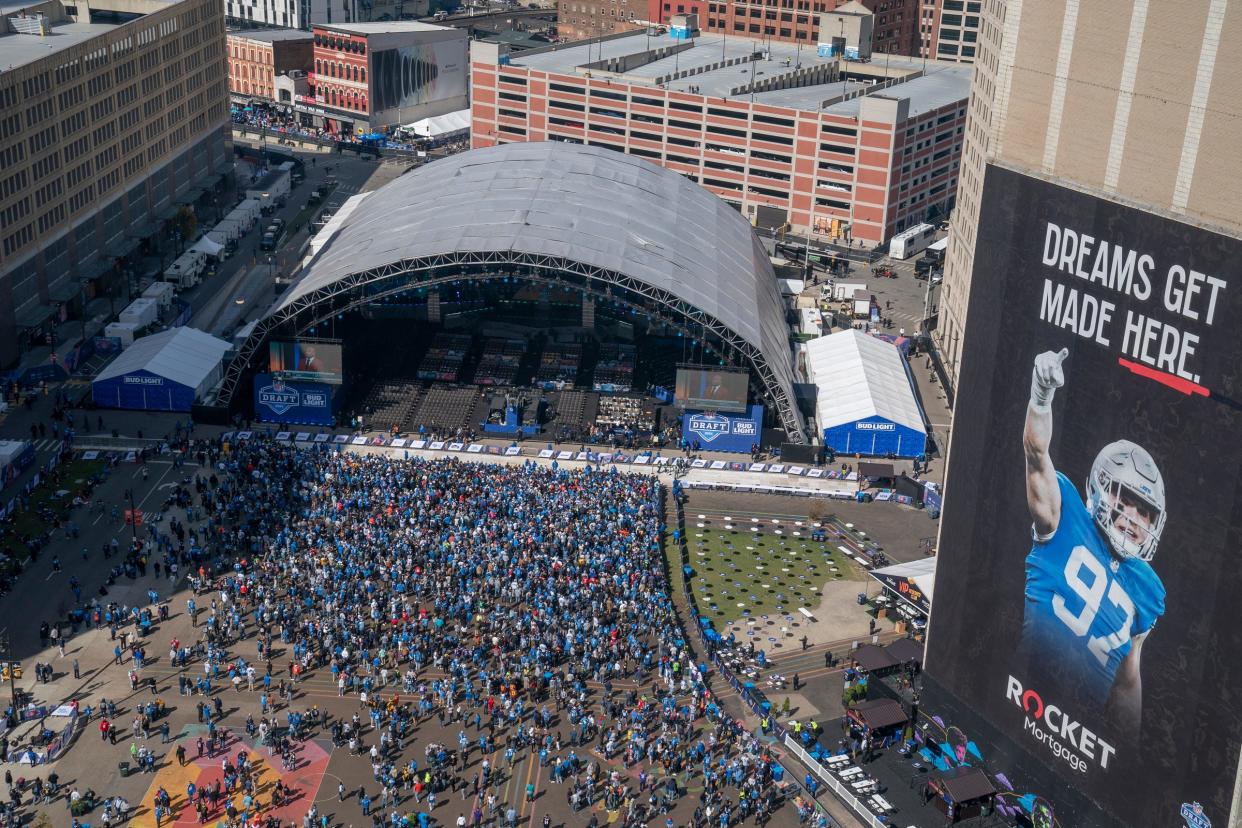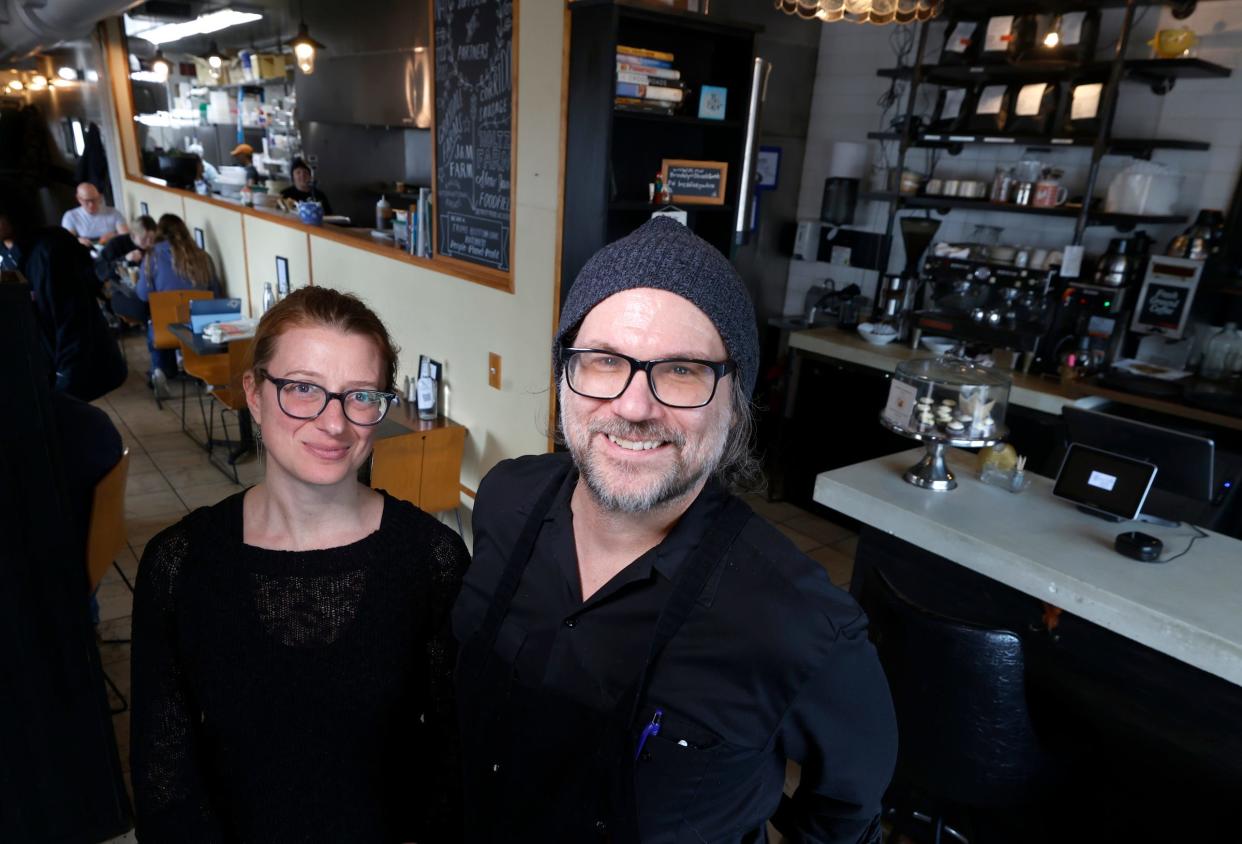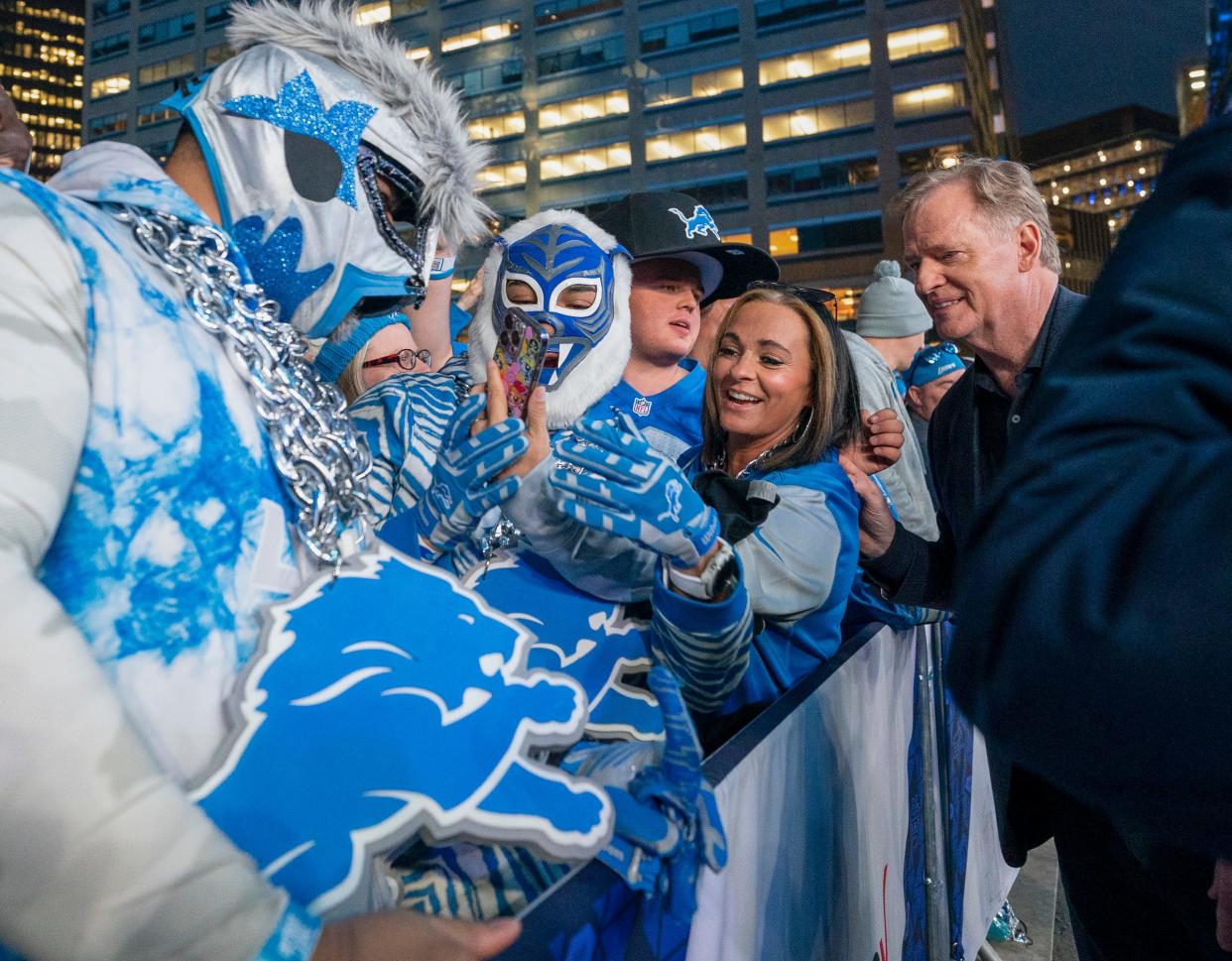Economic impact of Detroit's NFL draft likely to smash initial predictions
Those $15 Bud Light beer cans and $500-a-night hotel rooms — and that reported record attendance of more than 775,000 over three days of fanatical football frenzy — will add up to an electric economic jolt from the 2024 NFL draft in Detroit.
The 2023 NFL draft in Kansas City reportedly led to $164.3 million in overall economic impact when last year's draft figures were tallied, and Kansas City's draft had less than half the attendance of Detroit at 312,000 people.
The economic impact of the NFL draft in Nashville in 2019 — which held the previous record attendance of 600,000— was pegged at $224 million. Five years ago in late May, the NFL and the Nashville Convention & Visitors Corp. announced that NFL draft generated a record $133 million in direct spending in the Music City — a 79% increase over the $74 million at the 2018 NFL draft in Dallas, according to a report on the Tennessee Titans website.
More: Will Detroit beat Kansas City when it comes to crowds, economic impact of NFL draft?
Detroit's economic impact numbers surely are expected to be higher and even better than earlier expectations, given the steady inflow of Pittsburgh Steelers, Cincinnati Bengals, Chicago Bears, Green Bay Packers and other NFL fans into the city on Thursday, Friday and Saturday. But we don't have a firm number yet — and likely won't get one until later in May.

On Wednesday, Visit Detroit CEO Claude Molinari spoke on a panel called "Motor City Momentum: Draft Day Economics" held on the rooftop of a downtown building. A day before the draft began, he projected that the NFL draft will generate between $175 million to $200 million in economic growth in Detroit.
Molinari said Monday original estimates at one point were somewhere between $150 million to $175 million. "I think we’re going to go way beyond that," he said Monday morning.
Visit Detroit is working with Patrick Rishe, a sports economist, to conduct a full, post-event economic impact analysis, which is expected in late May or later. Rishe is director of the sports and business program and a professor of practice in sports business at the Olin Business School at Washington University in St. Louis. He did not respond to requests from the Free Press for comments on his early impression of Detroit's experience.
Much of the story will depend on where people spent their money, and perhaps on where they didn't. While it was inspiring to see all that Honolulu blue sported by Detroit Lions fans who flooded the NFL draft area at key spots near Woodward Avenue and along Jefferson Avenue, you can't say that's all new money coming into town. Those locally based fans would have spent their money somewhere else, likely locally, if they didn't go to the draft. At some level, it's moving plastic — or paper cash — around a chess board.
On Monday afternoon, the East Lansing-based Anderson Economic Group pegged the number at more than $165 million for the "net economic impact" of the 2024 NFL draft in downtown Detroit.
The economic consulting group's independent review takes into account both direct investment and spending that will generate economic impact, and indirect economic activity. Calculations, the company said, consider the substitution effects, such as spending that leaves the area, and potential lost spending from consumers who normally would visit downtown restaurants and other businesses but might avoid the area during big events.
The AEG total includes dollars spent inside and outside of the event in Detroit, including hotel stays, spending at restaurants and bars, and money spent on items such as sweatshirts, hats, and other goods bought during the draft. The free event made it more accessible to fans, AEG noted, however the free aspect removed the impact of ticket revenue.
AEG concluded that the draft will have a direct economic impact of $100,14 million on Detroit, with an estimated $37.7 million in total expenditures of attendees, after accounting for spending that leaves other areas and lost spending from regular customers.
“Hosting the NFL draft was an exciting win for Detroit and presented invaluable opportunities for the city to showcase its culture on a national stage, fostering long-term tourism and investment prospects," said Tyler Theile, chief operating officer and director of economic analysis at AEG, in a statement Monday.
More: Detroit officials take victory lap for successful NFL draft, give street closures update
Attracting new visitors to Detroit is far more meaningful on the economic scoreboard. And Detroit did that in a big fashion that many once never imagined was possible. You cannot judge the value of positive publicity surrounding the NFL draft in Detroit when it comes to building momentum and attracting other big crowd-generators, such as maybe even one day an NBA All-Star game.
Corktown's big outdoor tents didn't get the crowds
How much individual businesses benefited from the flood of fans into metro Detroit depends greatly on how far they were away from the NFL action, as teams picked the next college prospect.
Bars, restaurants and other businesses in Detroit’s historic Corktown worked for months to build a strategy for handling overflow crowds during the NFL draft. I reported on the high hopes in Corktown back in March. Corktown's vision even drew a mention as part of national NFL draft coverage Thursday in the New York Times.
Corkown — a few miles from NFL Commissioner Roger Goodell's announcements of the latest draft picks —promoted its big tents, big drinks, and big shuttles.
But some bars and restaurants didn’t see an onslaught of fanatical football fans on the first night on Thursday.
Thursday “was not as busy as we thought, but we did see some folks come in when things filled up downtown,” said Matt Buskard, owner of Bobcat Bonnie’s in metro Detroit. The first Bobcat Bonnie’s opened in Corktown.
“Hopefully, this weekend is busier, we could use it,” Buskard said on Friday afternoon. Like many areas in the country, he said, Corktown has seen lower sales and foot traffic in general, even in spite of some exciting developments, and could use the boost.
On Monday morning, Buskard said he didn't want to "come off as a negative person, but wow, the draft was a flop in the neighborhood."
Some businesses, he said, saw a small increase of maybe a few hundred dollars. Yet, he added: "I am super impressed that downtown did so darn well."
Deveri Gifford, the co-owner of Brooklyn Street Local on Michigan Avenue at Brooklyn Street, agreed that the Thursday crowd wasn’t large, but she noted that big crowds showed up for breakfast Friday morning when many large parties gathered together. Friday afternoon wasn’t quite as busy, she said, but stayed steady.
She expected more traffic for brunch Saturday and Sunday, noting that the small restaurant had set up a patio bar to be able to serve guests more quickly and offer some grab-and-go items there.

Corktown offered complimentary shuttles to downtown for those heading to the draft footprint in Campus Martius.
And Buskard, who serves on the board of the Corktown Business Association, said six restaurants in the neighborhood added heated viewing tents, each with their own personality and food and drinks, to handle overflow crowds and offer a spot for those who wanted to watch the NFL draft on big screen TVs.
But opt to sit in a beer tent, even a heated one when the weather was mild, and watch a big screen TV when the real party was just 2 or 3 miles away? Nah, I don't think so.
“Our parking lots were full. Our Corktown shuttle did great. But, unfortunately, the people parked in our lots, got on the shuttle, and went downtown,” said Dennis Fulton, owner and managing partner for Mercury Burger & Bar, which has been operating in Corktown for more than 10 years.
The viewing tents didn’t do very well, he said, but the Mercury Burger & Bar didn’t take on an extra cost to set up the tent because it was sponsored by Red Bull.
“The way it was set up, if you weren’t in the (NFL draft) footprint, you didn’t get slammed,” said Fulton, 68, a retired commander with the Detroit Police Department.
He said the Mercury Burger & Bar saw a “slight uptick” in business, maybe an increase of 10% to 15% or more from a typical weekend. “We did do a good business, but we were hoping for something a little more.”
Detroit draft frenzy kept on going
Football fans, naturally, wanted to try to catch a glimpse of the real action in real time in real crowds packed shoulder to shoulder outside the colorful lights that decorated the elaborate NFL stage built for the draft. Entry to the NFL draft footprint in Detroit was free, even if the food and drink prices gave a new meaning to inflation.
The frenzy was so incredible that NFL officials even decided early Thursday to suspend the use of QR codes that fans received when they registered for the free entry into draft spaces and activities. And that might have been a wise move, given that the area hit maximum capacity levels early in the game Thursday. The league announced at around 7 p.m. Thursday that no one else would be allowed inside the draft footprint for the night, even though it was to stay open until 10 p.m. Capacity levels were also hit Friday evening.
2024 NFL draft is done: Here are all the transformative things it left behind in Detroit
Sandy Simmons, a manager at the popular Corktown sports bar Nemo's, said business was great all three days inside the bar and restaurant throughout the draft. Not so much for the tent outside Nemo's, which was sponsored by Miller Brewing Co.
"The bar itself stayed consistently steady," Simmons said. "Day and night."
"The tents in Corktown, we were hoping they would be busier," she said. "With something like this, there was just so much unknown."
"Corktown being removed from the area, we didn't really know what to expect. But we wanted to be prepared. We wanted to be staffed," said Simmons, who has worked at Nemo's for more than 40 years.
"We wanted to be ready for whatever came at us."
The majority of the crowd, Simmons said, stayed closer to the Campus Martius area and Hart Plaza. "Those restaurants were probably really over-the-top crazy."

Many people, especially those who traveled to Detroit from other major NFL cities, like Cincinnati or Pittsburgh, stood in line for concessions or food trucks set up near the draft itself, not necessarily leaving the action to visit a brick-and-mortar spot. I visited Saturday, for example, and stood in a super short line to get coffee early in the afternoon at Avalon International Breads on Woodward where, by the way, I spotted that a can of Bud Light was selling for $5 — not the $15 price tag inside the NFL draft footprint.
Even so, Simmons said she loved the level of enthusiasm and excitement that embraced Detroit during the draft.
"It was so fun to see different jerseys and face paint. People really were playing the part," she said. "It was a lot of fun meeting people and talking to people."
Detroit, she said, was in so much better shape than during the bleaker, blight-filled days when the city hosted Super Bowl XL in 2006, when the premier event was a reward to the Lions for moving into the new multipurpose, indoor Ford Field.
Free Press business writer JC Reindl contributed.
Contact personal finance columnist Susan Tompor: stompor@freepress.com. Follow her on X (Twitter) @tompor.
This article originally appeared on Detroit Free Press: Detroit's economic jolt should be better than expected for NFL draft
